Why are there so many Canadians in Lebanon?
Jul 19th, 2006 | By Counterweights Editors | Category: Countries of the World Canadians watching the beginnings of what the hyperbolic right is calling World War III (or IV) on US TV have a right to be a bit puzzled by the news that there are only an “estimated 25,000 Americans … in Lebanon.” According to the local media in Canada, “officials estimate that at least 50,000 Canadians” are (or were) there (as of July 18, 2006). Usually, when there are about 25,000 Americans doing something, there are about 2,500 to 3,000 Canadians doing more or less the same thing. But in this case there are apparently twice as many Canadians as Americans in Lebanon at the moment – as Israel and an aspiring “new axis of power‘” in the Middle East, “comprising Syria, Iran, Hamas and Hezbollah,” lock horns. And it seems only reasonable to wonder why.
Canadians watching the beginnings of what the hyperbolic right is calling World War III (or IV) on US TV have a right to be a bit puzzled by the news that there are only an “estimated 25,000 Americans … in Lebanon.” According to the local media in Canada, “officials estimate that at least 50,000 Canadians” are (or were) there (as of July 18, 2006). Usually, when there are about 25,000 Americans doing something, there are about 2,500 to 3,000 Canadians doing more or less the same thing. But in this case there are apparently twice as many Canadians as Americans in Lebanon at the moment – as Israel and an aspiring “new axis of power‘” in the Middle East, “comprising Syria, Iran, Hamas and Hezbollah,” lock horns. And it seems only reasonable to wonder why.
Trying to follow the confusing Lebanese numbers game in Canada …
 The question of just how many Canadians might potentially have to be rescued from Lebanon, in the wake of the Israeli attacks that began on July 12 (following the Hezbollah kidnapings) has been confusing from the start. And the tragic case of the “seven Canadians, all members of the same Montreal family,” who “were killed in an Israeli air strike in Lebanon” on July 16, has only deepened the mystery.
The question of just how many Canadians might potentially have to be rescued from Lebanon, in the wake of the Israeli attacks that began on July 12 (following the Hezbollah kidnapings) has been confusing from the start. And the tragic case of the “seven Canadians, all members of the same Montreal family,” who “were killed in an Israeli air strike in Lebanon” on July 16, has only deepened the mystery.
As recently as July 15 it was being reported that: “There are about 10,000 Canadians registered as being in Lebanon, according to the Foreign Affairs Department in Ottawa.” (Or, more exactly on July 14: “Foreign Affairs spokesperson Amber Dickey says about 10,000 Canadians in Lebanon are registered with the embassy in Beirut.”) This was still surprisingly more, relatively speaking, than the 25,000 Americans. But it was only the start.
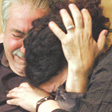 By the time the seven members of the Montreal family had been killed on July 16, the local media were advising that: “Meanwhile, the Canadian government is reportedly sending in commercial ships to evacuate as many as 40,000 Canadians from Lebanon … The Foreign Affairs Department says 16,000 Canadians are registered and likely two to three times that many are in the country.”
By the time the seven members of the Montreal family had been killed on July 16, the local media were advising that: “Meanwhile, the Canadian government is reportedly sending in commercial ships to evacuate as many as 40,000 Canadians from Lebanon … The Foreign Affairs Department says 16,000 Canadians are registered and likely two to three times that many are in the country.”
Just two days later, on July 18, the word was that the “government doesn’t know how many Canadians want out, but the number of those registered with the government has doubled to about 25,000 in the last few days and about 50,000 are believed to be in the country.” (And according to the website of the Canadian Embassy in Lebanon: “The Canadian Government has arranged for sea vessels to assist Canadians wishing to depart Lebanon. All costs related to the evacuation of Canadian citizens from Lebanon will be borne by the Government of Canada. Current planning would see departures from Lebanon beginning Wednesday July 19, 2006.” On July 19 that did seem to be starting to happen – though in the midst of considerable if somewhat understandable chaos, and many, many complaints. Meanwhile the number of Canadians in Lebanon registered with the Canadian Embassy jumped to 30,000. On July 20 the chaos and the slowness of Canada’s response is still very much in the air – and has started to be more deeply analyzed in the news.)
The Lebanese community in Canada …
 However you look at it all, it is (or ought to be) suddenly becoming increasingly clear to non-Lebanese Canadians that there are unusually large numbers of Canadians in Lebanon. As the Toronto Star has now reported, the “50,000 Canadians … living in Lebanon” make up “one of the largest contingents of foreign nationals in the country.”
However you look at it all, it is (or ought to be) suddenly becoming increasingly clear to non-Lebanese Canadians that there are unusually large numbers of Canadians in Lebanon. As the Toronto Star has now reported, the “50,000 Canadians … living in Lebanon” make up “one of the largest contingents of foreign nationals in the country.”
This will probably come as much less of a surprise to the current quarter-million Canadians of Lebanese descent. And it doesn’t take too much digging on the world wide web for non-Lebanese Canadians to start to catch up. A 2002 article about “the Lebanese-Canadian community” as “a piece of Canada’s cultural mosaic,” on a Canadian federal government website, is one good place to begin trying to answer the question of just why there are so many Canadians in Lebanon, at the present awkward moment in the latest Middle East crisis.
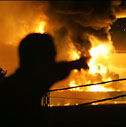 To start with: “The long-standing connection between Canada and Lebanon stretches back over 100 years to when the first Arabic-speaking immigrants arrived in Canada – along with immigrants from other parts of the world, particularly eastern, central and southern Europe … By 1901 there were about 2,000 Syrian-Lebanese in Canada. Between 1911 and 1951 an immigration policy restricting Asiatics,’ which included immigrants of Arab origin, reduced the steady influx of new immigrants from Lebanon and Syria. But from the mid-1950s onward, the Lebanese have continued to be the largest group of Arabs in Canada.”
To start with: “The long-standing connection between Canada and Lebanon stretches back over 100 years to when the first Arabic-speaking immigrants arrived in Canada – along with immigrants from other parts of the world, particularly eastern, central and southern Europe … By 1901 there were about 2,000 Syrian-Lebanese in Canada. Between 1911 and 1951 an immigration policy restricting Asiatics,’ which included immigrants of Arab origin, reduced the steady influx of new immigrants from Lebanon and Syria. But from the mid-1950s onward, the Lebanese have continued to be the largest group of Arabs in Canada.”
“In the mid-1970s, during the Lebanese civil war, Canada was the only country [with the partial exception of Australia, other sources suggest] to adopt special immigration measures to assist Lebanese fleeing the conflict; it even set up an emergency visa office in Nicosia, Cyprus, in 1989. Since so many Lebanese already had family in Canada, it was easier for them to adjust to their new home here. In addition, the French influence in Lebanon, where Arabic and French are the official languages, made Montreal a natural choice for the majority of the newcomers.
 “Today, there are over 250,000 Lebanese in Canada. Besides Montreal, other major Lebanese communities are in Ontario, particularly in Ottawa (and across the Ottawa River in Gatineau, Quebec), Toronto, Hamilton, Windsor and London. There are large communities as well in Edmonton (Alberta) and Nova Scotia. [And note former PEI premier Joe Ghiz is of Lebanese descent, along with one of Ottawa’s gifts to North American pop music, Paul Anka.]
“Today, there are over 250,000 Lebanese in Canada. Besides Montreal, other major Lebanese communities are in Ontario, particularly in Ottawa (and across the Ottawa River in Gatineau, Quebec), Toronto, Hamilton, Windsor and London. There are large communities as well in Edmonton (Alberta) and Nova Scotia. [And note former PEI premier Joe Ghiz is of Lebanese descent, along with one of Ottawa’s gifts to North American pop music, Paul Anka.]
” In many cases the first wave of immigrants never returned to their homeland. In contrast, subsequent generations have maintained strong ties with Lebanon: they send substantial remittances to family, raise funds for charity and return frequently on vacation. Satellite and digital cable television and inexpensive phone cards have made it possible for most Lebanese immigrants to keep in regular contact with Lebanon in a way that was impossible for the early newcomers. There are economic ties too, with billboard signs in Beirut advertising merchandise made in Canada’ and shops carrying clothes made in Montreal’ … In recognition of the ties between Canada and Lebanon, the Lebanese government contributed funds to replace many of the trees that had been destroyed in Ottawa’s Rockcliffe Park during the historic 1998 ice storm.”
Other notes from the world wide web …
With all this as deep background, there are various further intriguing bits of internet intelligence that at least cast some additional light on the question of just why there are so many Canadians in Lebanon, at the present awkward moment in the latest Middle East crisis; e.g.:
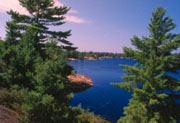 1. Religious background. For various unfortunate reasons, the religion statistics for Lebanon are worth noting. According to the CIA World Factbook, at present they are: “Muslim 59.7% (Shi’a, Sunni, Druze, Isma’ilite, Alawite or Nusayri), Christian 39% (Maronite Catholic, Greek Orthodox, Melkite Catholic, Armenian Orthodox, Syrian Catholic, Armenian Catholic, Syrian Orthodox, Roman Catholic, Chaldean, Assyrian, Copt, Protestant), other 1.3%.”
1. Religious background. For various unfortunate reasons, the religion statistics for Lebanon are worth noting. According to the CIA World Factbook, at present they are: “Muslim 59.7% (Shi’a, Sunni, Druze, Isma’ilite, Alawite or Nusayri), Christian 39% (Maronite Catholic, Greek Orthodox, Melkite Catholic, Armenian Orthodox, Syrian Catholic, Armenian Catholic, Syrian Orthodox, Roman Catholic, Chaldean, Assyrian, Copt, Protestant), other 1.3%.”
On the other hand, according to a study based on the 1991 census in Canada: “33% of immigrants from Lebanon were affiliated with the Catholic Church … 24% were Eastern Orthodox” and “10% were Protestant” [for a total of 67% Christian] … “29% were Moslems … 1% were affiliated with other religions” and “2% said they had no religious affiliation.”
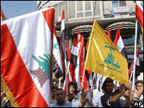 2. Lebanese Christian majority in Canada speaks out. As recently as June 30, 2006, the Canadian Lebanese Human Rights Federation put out a press release, entitled “Nobody should be allowed to use our beloved Canada as a platform to spread terrorism and hatred.”
2. Lebanese Christian majority in Canada speaks out. As recently as June 30, 2006, the Canadian Lebanese Human Rights Federation put out a press release, entitled “Nobody should be allowed to use our beloved Canada as a platform to spread terrorism and hatred.”
The press release went on: “The CLHRF applauds His Excellency, Our Prime Minister Stephen Harper and his federal Conservative Cabinet members for their courageous and wise decision in denying British Sheik Riyad Ul-Haq entry into Canada on the grounds that he incites racial hatred … On behalf of the Canadian Lebanese Human Rights Federation and the hundreds of thousands of Canadians of Lebanese descent who believe in the basic tenets of freedom, democracy and peace, we would like to extend to Mr. Harper and his Cabinet all our sincere and heartfelt thanks … The CLHRF fully embraces all human rights, freedoms and democracies. Also, as Christians, we proudly wear our fundamental cloaks of peace, love and forgiveness.”
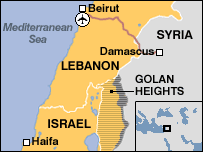 3. Trying to impose new facts on the ground? The websites of the Canadian Lebanese Human Rights Federation and the apparently related Lebanese Canadian Co-ordinating Council also include assorted other bits of intriguing information at the moment. Consider, e.g., a July 18 article entitled “Yes to Solidarity, But the Truth Must be Told,” by Ali Hamadeh.
3. Trying to impose new facts on the ground? The websites of the Canadian Lebanese Human Rights Federation and the apparently related Lebanese Canadian Co-ordinating Council also include assorted other bits of intriguing information at the moment. Consider, e.g., a July 18 article entitled “Yes to Solidarity, But the Truth Must be Told,” by Ali Hamadeh.
Mr. Hamadeh urges that “if, as we said, this is a period of solidarity, this should not exonerate Hezbollah from a coming accountability to which it must be held after the guns fall silent for what happened and for the consequences of its monopolizing the decision that implicated and implicates the fate of our country … today we are alone in this open war. For the Arabs, through the Europeans and on to the Big Eight … all constitute a big circle that supports the Israeli war and gives it a sufficient political and time window to try and impose new facts on the ground.”
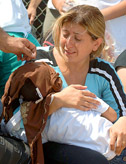 4. Official Canadian government websites. The website of the Canadian Embassy in Lebanon has the latest news on what is and is not being done for Canadians in Lebanon (and Syria) at the moment. Citizenship and Immigration Canada has also posted a “Notice” on the current “Situation in the Middle East.”
4. Official Canadian government websites. The website of the Canadian Embassy in Lebanon has the latest news on what is and is not being done for Canadians in Lebanon (and Syria) at the moment. Citizenship and Immigration Canada has also posted a “Notice” on the current “Situation in the Middle East.”
The CIC Notice reads, in part: “Citizenship and Immigration Canada (CIC) is carefully monitoring the situation in Lebanon. Our visa office in Beirut …remains open and will be concentrating on processing priority cases … Canadian citizens and Canadian permanent residents as well as their spouses, common-law partners, conjugal partners and dependent children … the Beirut visa office will no longer be accepting new applications for people who wish to visit, study or work temporarily in Canada, with the exception of the priority cases listed above … the office will continue to process applications that have already been submitted.”
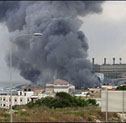 5. Treatment of dual nationals in Canadian Content Travel Advisory. An apparently longstanding travel advisory about Lebanon on the Canadian Content website reports: “There is a highly visible security presence throughout the country. Canadians should carry full personal documentation and obey the instructions of security personnel. Canadians of Lebanese descent who carry Lebanese papers will be treated as Lebanese nationals by security officials. Canadian officials may be limited in their ability to provide consular services in cases where a dual national [i.e. a person who holds both Canadian and Lebanese citizenship] runs into difficulty.”
5. Treatment of dual nationals in Canadian Content Travel Advisory. An apparently longstanding travel advisory about Lebanon on the Canadian Content website reports: “There is a highly visible security presence throughout the country. Canadians should carry full personal documentation and obey the instructions of security personnel. Canadians of Lebanese descent who carry Lebanese papers will be treated as Lebanese nationals by security officials. Canadian officials may be limited in their ability to provide consular services in cases where a dual national [i.e. a person who holds both Canadian and Lebanese citizenship] runs into difficulty.”
6. Recent academic study. Dalia Abdel-Hady of Southern Methodist University in the US recently presented an interesting paper entitled “Public Engagement of Lebanese Immigrants in Three World Cities” [Montreal, New York, and Paris], at the University of California at Irvine. We’re assuming Ms. Abdel-Hady would not mind our quoting one especially interesting paragraph in the present context:
 “Many Lebanese immigrants consider Canada to be the ultimate land of settlement, a place where children can have a decent future … With its emphasis on multiculturalism and ethnic pluralism, Canada is seen as providing Lebanese immigrants with the opportunity to form communities that reinforce social attachments and political commitments to the homeland and maintain their ethnic cultural identity … Speaking of Lebanese immigration to Canada following the civil war, Hayani … observes that: The precarious balance that had kept in check volatile and explosive religious forces in Lebanon came apart with horrendous consequences for the Lebanese people in the mid-1970s. Tens of thousands of Lebanese came to Canada … Some came under the new immigration category of business investors, and others came as refugees. Many of the latter category were probably of Palestinian origin.'”
“Many Lebanese immigrants consider Canada to be the ultimate land of settlement, a place where children can have a decent future … With its emphasis on multiculturalism and ethnic pluralism, Canada is seen as providing Lebanese immigrants with the opportunity to form communities that reinforce social attachments and political commitments to the homeland and maintain their ethnic cultural identity … Speaking of Lebanese immigration to Canada following the civil war, Hayani … observes that: The precarious balance that had kept in check volatile and explosive religious forces in Lebanon came apart with horrendous consequences for the Lebanese people in the mid-1970s. Tens of thousands of Lebanese came to Canada … Some came under the new immigration category of business investors, and others came as refugees. Many of the latter category were probably of Palestinian origin.'”
Two last items on this round of the endless wider Middle East conflict …
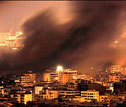 On July 16, Canadian commentator Linda McQuaig published a piece in the Toronto Star, on the wider significance of the latest Middle East crisis, entitled “Wildly disproportionate attack on Lebanon seems like pretext to confront Iran.”
On July 16, Canadian commentator Linda McQuaig published a piece in the Toronto Star, on the wider significance of the latest Middle East crisis, entitled “Wildly disproportionate attack on Lebanon seems like pretext to confront Iran.”
Ms. McQuaig urged: “The U.S. and Israel …are very keen to attack Iran … Pulitzer Prize-winning investigative journalist Seymour Hersh has detailed Washington’s plans to attack Iran. Israel has called Iran a major threat’ that must be stopped’ from developing nuclear weapons … But the U.S. and Israel don’t want to look like aggressors … So when Hezbollah militants in southern Lebanon seized two Israeli soldiers last week, a perfect opportunity arose. Since Hezbollah has links to Iran, presto, here was a prima facie case that Iran was gunning for confrontation.”
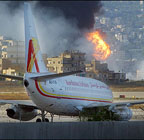 Here’s certainly hoping that Ms. McQuaig (on the left) and those (on the right) in the US, like Newt Gingrich, who have been talking wildly about World War III on TV, are all just plain wrong. (And Ali Hamadeh’s thoughts above about “a sufficient political and time window to try and impose new facts on the ground” does seem a more sober assessment – regardless of just who it is trying to impose the new facts, and just how successful they may or may not finally be, at just what appalling costs in both innocent and guilty human lives.)
Here’s certainly hoping that Ms. McQuaig (on the left) and those (on the right) in the US, like Newt Gingrich, who have been talking wildly about World War III on TV, are all just plain wrong. (And Ali Hamadeh’s thoughts above about “a sufficient political and time window to try and impose new facts on the ground” does seem a more sober assessment – regardless of just who it is trying to impose the new facts, and just how successful they may or may not finally be, at just what appalling costs in both innocent and guilty human lives.)
Meanwhile, a 2001 country profile of Lebanon prepared by the Ontario provincial government’s trade promotion people does suggest that no one ought to be too surprised about what is happening there in the summer of 2006: “Once the financial centre of the Middle East, Lebanon was devastated by a protracted civil war from 1975 to 1990 and has been struggling to recover ever since. Lebanon’s risk outlook is high.” It “remains caught in the middle of a protracted military dispute between Syria and Israel. Moreover, the Israeli-Palestinian conflict could easily spread to Lebanon given Lebanon’s sizeable Palestinian population and the prominence of Hezbollah in the south … Lebanon is also increasingly in danger of suffering a financial meltdown, given its public debt burden of 145% of GDP.”
 Or, even if you leave Iran out of the picture altogether, there are still plenty of unhappy reasons for what is going on now.
Or, even if you leave Iran out of the picture altogether, there are still plenty of unhappy reasons for what is going on now.
(And meanwhile again, with an eye on the next Canadian federal election, no doubt, it has just been announced that “His Excellency, Our Prime Minister Stephen Harper” [see above] “will head to Cyprus later Wednesday” – i.e., today, July 19 – “to meet Canadians fleeing Lebanon and help in efforts to bring them home.”)
L’envoi … AN UPDATE ON JULY 25 …
Inevitably things have been changing quickly over the past half-dozen days. A report by Gloria Galloway in today’s Globe and Mail sharpens the picture somewhat:
“Fewer than one quarter of the Canadians registered with their embassy in Lebanon have taken up the government’s offer to get them out of the war-torn country, as officials say dwindling numbers mean the evacuation is winding down.
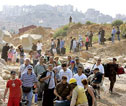 “By late yesterday afternoon, after five days of exodus, slightly more than 7,900 people had boarded ships chartered by Canada to take them to safety. Only 2,800 of that number had actually reached Canadian soil, leaving thousands of evacuees in transit on ships headed for Turkey or Cyprus, on the ground there, or on airplanes headed to Canada.
“By late yesterday afternoon, after five days of exodus, slightly more than 7,900 people had boarded ships chartered by Canada to take them to safety. Only 2,800 of that number had actually reached Canadian soil, leaving thousands of evacuees in transit on ships headed for Turkey or Cyprus, on the ground there, or on airplanes headed to Canada.
“There are more than 38,000 people [up again from the 30,000 most recently reported above] registered with the Canadian embassy in Beirut. While Foreign Affairs representatives refused to say publicly how many of that total they believe to be tourists and how many have settled permanently in Lebanon, one official estimated yesterday that the temporary visitors account for about 20 per cent of the total.
“That number roughly corresponds with the number that have fled so far, which suggests that many of those who live in Lebanon have decided to tough it out.”
* * * *
Jeffrey Simpson’s July 25 column in the same paper suggests that one lesson Canada ought to take from the Lebanon evacuation is “review dual citizenship.” More exactly:
 “It’s way too late to think of eliminating dual citizenship, even were the elimination desirable. Australia thought of trying to go that route, and gave up. The United States once forbade dual citizenship but relented about two decades ago.
“It’s way too late to think of eliminating dual citizenship, even were the elimination desirable. Australia thought of trying to go that route, and gave up. The United States once forbade dual citizenship but relented about two decades ago.
“Dual citizenship is a fact of life, but it’s a misunderstood fact, one that a parliamentary committee could usefully explore and explain to Canadians.
“We seem to believe that, because a person carries a Canadian passport, that person thinks of himself as a Canadian and has an absolute right to assistance from the Canadian government while outside Canada. Both beliefs are false, and potentially dangerous.
“It is worth at least asking whether we have made the acquisition of Canadian citizenship so easy – divorcing it, once acquired, from residence in the country – that we have spawned legions of citizens of convenience …
 “We should also understand that a dual citizen in another country is not always considered a Canadian … a holder of Iranian and Canadian passports, or Syrian and Canadian passports, is not considered by the authorities in those countries to be a Canadian, but rather an Iranian or Syrian … Canadian consular help to such dual nationals [can be] limited … especially in times of crisis.”
“We should also understand that a dual citizen in another country is not always considered a Canadian … a holder of Iranian and Canadian passports, or Syrian and Canadian passports, is not considered by the authorities in those countries to be a Canadian, but rather an Iranian or Syrian … Canadian consular help to such dual nationals [can be] limited … especially in times of crisis.”
At counterweights we don’t always agree with everything Mr. Simpson says. But the evacuation of dual-national (and perhaps even a few other?) Canadians from Lebanon in the summer of 2006 does suggest that what he is saying here is worth thinking about. “National citizenship” in the global village nowadays is becoming an increasingly complex subject, no doubt.
We are all becoming “citizens of the world” in some senses, no doubt as well. And that is a good thing. But, as the continuing deep commitment of many Lebanese Canadians to Lebanon also shows, the national state is not becoming obsolete at the same time. In the end “multiculturalism” cannot mean that the nature of the Canadian national state is going to be defined by citizens who do not spend most of their time in Canada. Even in the open-ended kind of country that many Canadians of all origins happily do want Canada to be, that would not make any sense at all.

